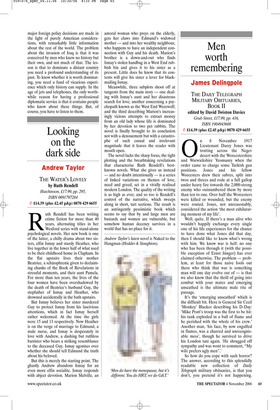Looking on the dark side
Andrew Taylor
THE WATER’S LOVELY by Ruth Rendell
Hutchinson, £17.99, pp. 295, ISBN 0091797284
✆ £14.39 (plus £2.45 p&p) 0870 429 6655 Ruth Rendell has been writing crime fiction for more than 40 years, alternating titles in her Wexford series with stand-alone psychological novels. Her new book is one of the latter, a chilly drama about two sisters, elfin Ismay and sturdy Heather, who live together in the lower half of what used to be their childhood home in Clapham. In the flat upstairs lives their mother Beatrice, a schizophrenic given to declaiming chunks of the Book of Revelations in stressful moments, and their aunt Pamela. For more than ten years, the lives of the four women have been overshadowed by the death of Beatrice’s husband Guy, the stepfather of Ismay and Heather, who drowned accidentally in the bath upstairs.
But Ismay believes her sister murdered Guy to protect Ismay from his lascivious attentions, which in fact Ismay herself rather welcomed. At the time the girls were 15 and 13 respectively. Now Heather is on the verge of marriage to Edmund, a male nurse, and Ismay is desperately in love with Andrew, a dashing but ruthless barrister who bears a striking resemblance to the deceased Guy. Ismay agonises over whether she should tell Edmund the truth about his beloved.
But this is merely the starting point. The ghastly Andrew abandons Ismay for an even more elfin socialite. Ismay responds with abject devotion. Marion Melville, an amoral woman who preys on the elderly, gets her claws into Edmund’s widowed mother — and into her wealthy neighbour, who happens to have an independent connection with Guy and his death. Marion’s brother is a down-and-out who finds Ismay’s stolen handbag in a West End rubbish bin and gives it to his sister as a present. Little does he know that its contents will give his sister a lever for blackmailing Ismay.
Meanwhile, three subplots shoot off at tangents from the main story — one dealing with Ismay’s aunt and her disastrous search for love; another concerning a psychopath known as the West End Werewolf; and the third describing Marion’s increasingly vicious attempts to extract money from an old lady whose life is dominated by her devotion to two pet rabbits. The novel is finally brought to its conclusion not with a denouement but with a catastrophe of such casual and irrelevant magnitude that it leaves the reader with mouth open.
The novel lacks the sharp focus, the tight plotting and the breathtaking revelations that characterise Ruth Rendell’s bestknown novels. What she gives us instead — and no doubt intentionally — is a series of linked variations on themes of love, need and greed, set in a vividly realised modern London. The quality of the writing is as high as ever, and so too is Rendell’s control of the narrative, which sweeps along in short, tart sections. The result is an astringently pessimistic book which seems to say that by and large men are bastards and women are vulnerable, but somehow human decency survives in a world that has no place for it.
Andrew Taylor’s latest novel is Naked to the Hangman (Hodder & Stoughton).


















































































































 Previous page
Previous page